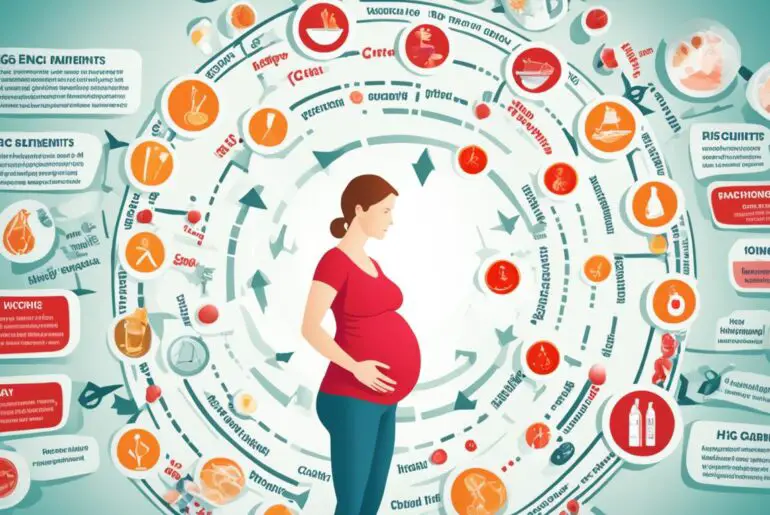Did you know that the HCG diet, a weight-loss trend gaining popularity, can pose significant risks to pregnant women and their unborn babies? Despite its allure as a quick-fix solution, this diet’s potential dangers cannot be ignored. Let’s explore the risks associated with the HCG diet during pregnancy and understand why it is crucial for expectant mothers to prioritize their health and seek safer alternatives.
Key Takeaways:
- The HCG diet involves severe calorie restriction and the use of human chorionic gonadotropin (HCG), a hormone produced during pregnancy.
- The FDA advises against using HCG for weight loss, as it has not been proven effective and can pose health risks.
- The extremely low-calorie nature of the HCG diet can lead to gallstone formation, irregular heartbeat, nutrient deficiencies, and electrolyte imbalances.
- Pregnant women should explore safer ways to manage weight loss and consult with a healthcare provider for guidance.
- Seeking medical supervision during pregnancy is crucial to ensure the health of both the mother and the developing baby.
FDA Warning Against HCG Diet Products
The FDA has issued a strong warning regarding the use of HCG weight-loss products, particularly during pregnancy. These products are widely available over-the-counter and claim to facilitate rapid weight loss. However, the FDA has deemed them illegal and lacking in both safety and efficacy. It is essential to prioritize the well-being of pregnant women and their unborn babies by steering clear of these potentially dangerous products.
Despite being labeled as “homeopathic,” the FDA considers these products unsafe. Companies that sell them are in violation of the law. It is important to note that the FDA-approved HCG medications are intended solely for fertility treatment purposes and have no proven effectiveness for weight loss. The medications carry warning labels stipulating their ineffectiveness for weight loss.
FDA Warning on HCG Diet Products
“The FDA advises against using over-the-counter HCG weight-loss products, as they are illegal and have not been proven safe or effective for weight loss. Furthermore, the FDA-approved HCG medications are not approved for weight loss purposes.” – FDA Spokesperson
Pregnant women are strongly advised to avoid using HCG diet products due to the potential risks involved and the lack of evidence supporting their safety during pregnancy. Ensuring the health and well-being of both the mother and the developing baby must take precedence over any desire for rapid weight loss.
It is crucial to consult with healthcare providers to explore safer alternatives for managing weight during pregnancy. These professionals can guide expectant mothers in making sound decisions that prioritize their health and the health of their babies.
List of FDA Warnings Against HCG Diet Products
- The FDA warns against using over-the-counter HCG weight-loss products.
- Such products are deemed illegal and lack evidence of safety or effectiveness for weight loss.
- FDA-approved HCG medications are solely for fertility treatment, not weight loss.
- Companies selling HCG weight-loss products are in violation of the law.
- Pregnant women should avoid using HCG diet products due to potential risks.
- Consulting with healthcare providers is essential for exploring safer weight management options during pregnancy.
By adhering to the FDA’s warnings and seeking appropriate medical guidance, pregnant women can safeguard their health and promote healthy and safe weight management practices.
Impact of HCG Diet on Pregnancy

The HCG diet is not recommended for pregnant women due to the potential negative impact it can have on pregnancy. The severe calorie restriction of the diet does not provide enough nutrients and calories to support both the mother’s body and the developing baby.
The high levels of HCG hormones associated with the diet could potentially have adverse effects on the pregnancy. It is important for expectant mothers to prioritize their health and the health of their baby by following a balanced diet and seeking appropriate medical guidance during pregnancy.
| Complications | Negative Impact |
|---|---|
| 1. Nutrient deficiencies | 1. Inadequate support for mother and baby’s health |
| 2. Electrolyte imbalances | 2. Disruption in bodily functions |
| 3. Gallstone formation | 3. Risk of gallbladder issues |
| 4. Irregular heartbeat | 4. Potential cardiovascular complications |
| 5. Adverse hormonal changes | 5. Disruption in pregnancy hormone balance |
“The HCG diet is not recommended for pregnant women due to the potential negative impact it can have on pregnancy.”
It is essential for pregnant women to prioritize their health and the health of their baby by opting for safer and more nutritionally balanced approaches to weight management during pregnancy.
Side Effects of HCG Diet in Pregnancy
The HCG diet is associated with several side effects in pregnant women. These side effects can be detrimental to the well-being of the mother and potentially impact the development of the fetus. It is crucial for expectant mothers to be aware of these potential risks before considering the HCG diet.
Fatigue and Irritability
One of the common side effects of the HCG diet in pregnant women is fatigue. The severe calorie restriction can result in low energy levels, making daily activities challenging. Additionally, the hormonal changes associated with pregnancy, combined with the HCG hormone, can lead to increased irritability and mood swings.
Fluid Buildup and Swelling
Another side effect of the HCG diet is fluid buildup, also known as edema. Pregnant women may experience swelling in their legs, feet, and hands due to fluid retention. This can be uncomfortable and may require adjustments in daily activities and clothing.
Depression and Restlessness
The combination of hormonal changes, calorie restriction, and the stress of pregnancy can potentially lead to symptoms of depression in pregnant women following the HCG diet. Feelings of restlessness and dissatisfaction with the diet plan may also arise, causing emotional distress.
Gynecomastia in Boys and Men
In rare cases, the HCG hormone used in the diet can cause swelling of the breast tissue in boys and men, a condition known as gynecomastia. This side effect is typically temporary and resolves once the HCG diet is discontinued. However, it is still a cause for concern.
Risk of Thromboembolism
One of the most serious side effects of the HCG diet in pregnant women is the increased risk of blood clots forming and blocking blood vessels, known as thromboembolism. This can be life-threatening for both the mother and the baby, requiring immediate medical attention.
It is crucial for pregnant women to prioritize their health and the health of their baby by opting for safer and more nutritionally balanced approaches to weight management. Consulting with a healthcare provider is essential to ensure the well-being of both the mother and the fetus.
Safer Alternatives for Weight Loss in Pregnancy

If weight loss is a goal during pregnancy, it is important to explore safer alternatives under the guidance of a healthcare provider. A balanced diet and regular exercise can support healthy weight management during pregnancy.
Pregnant women should focus on consuming nutrient-dense foods that provide the necessary vitamins and minerals for both the mother and developing baby. Caloric intake should be appropriate for the stage of pregnancy and individual needs.
Working with a healthcare provider can ensure that weight loss efforts are safe and suitable for pregnancy.
Important Precautions:
- Avoid restrictive diets: Crash diets or severe calorie restrictions can be harmful to both the mother and the baby. Opt for a well-balanced diet that meets nutritional needs.
- Include regular exercise: Engaging in moderate physical activity, such as walking or prenatal yoga, can help maintain a healthy weight and improve overall well-being.
- Monitor weight gain: It is important to monitor weight gain during pregnancy, but drastic weight loss should be avoided. Aim for gradual and steady weight loss, if necessary, under medical supervision.
- Stay hydrated: Drink plenty of water to stay hydrated and support the body’s natural processes.
- Seek professional guidance: Consult with a healthcare provider specializing in prenatal care to develop a personalized weight loss plan that ensures the well-being of both the mother and the baby.
“Maintaining a healthy weight during pregnancy is important, but it should never come at the expense of the baby’s growth and development. It’s crucial to prioritize safe and sustainable weight loss methods under medical supervision.” – Dr. Sarah Thompson, OB/GYN
By following these precautions and working closely with a healthcare provider, pregnant women can ensure that their weight loss efforts are safe, effective, and in the best interest of their own health and the health of their baby.
Importance of Medical Supervision
When considering any weight loss program during pregnancy, it is crucial for expecting mothers to prioritize their health and the well-being of their baby. Seeking medical supervision is essential to ensure that weight loss efforts are safe and appropriate for this important time.
Healthcare providers can provide valuable guidance on navigating weight management during pregnancy. They possess the expertise needed to offer recommendations based on individual health conditions, gestational age, and nutritional requirements.
Medical supervision plays a key role in monitoring and optimizing the health of both the mother and developing baby throughout the weight loss process. Regular check-ups and monitoring help to detect and address any potential complications or risks associated with weight loss methods.
By working closely with healthcare professionals, pregnant women can receive personalized support tailored to their specific needs. This ensures that weight loss efforts are carried out in a manner that does not compromise their health or the health of their baby.
“Working with a healthcare provider during pregnancy can provide essential guidance and oversight to ensure a safe and healthy weight loss journey.”
Benefits of Medical Supervision for Pregnant Women:
- Expert guidance on safe and effective weight loss methods
- Individualized weight management plans based on the unique needs of each woman
- Regular monitoring to identify and address potential complications or risks
- Access to crucial medical interventions and support when needed
With the guidance and support of healthcare providers, pregnant women can confidently embark on a weight loss journey that prioritizes their health and the health of their baby.
FDA Regulations on HCG Diet Products
The FDA implements stringent regulations to ensure the safety and efficacy of HCG diet products. Over-the-counter HCG weight-loss products are considered illegal and should be avoided. These products often claim to facilitate rapid weight loss and metabolic reset. However, it is important to note that any weight loss experienced while using these products is primarily a result of severe calorie restriction rather than the HCG hormone itself.
The FDA-approved HCG medications, on the other hand, are specifically intended for medical purposes such as fertility treatment and are not approved for weight loss. The labeling of these prescription medications explicitly states that they are not effective for weight loss.
Consumers should exercise caution when encountering misleading marketing claims related to HCG diet products. It is advised to consult with a healthcare provider to explore safe and regulated alternatives for weight loss.
Risks of Very Low-Calorie Diets

Very low-calorie diets, such as the HCG diet, pose significant health risks, particularly during pregnancy. Living on only 500 calories per day for an extended period is not only unhealthy but also dangerous. Such restrictive diets can lead to gallstone formation, electrolyte imbalances, irregular heartbeat, and nutritional deficiencies.
Pregnant women need adequate calories, nutrients, and protein to support their own health as well as the growth and development of the baby. It is essential to prioritize a balanced and nutritious diet during pregnancy to ensure the well-being of both the mother and the baby.
| Health Risks Associated with Very Low-Calorie Diets | Negative Impact of HCG Diet on Pregnancy |
|---|---|
| Gallstone formation | Increased risk of gallstone formation |
| Electrolyte imbalances | Potential electrolyte imbalances |
| Irregular heartbeat | Possible irregular heartbeat |
| Nutritional deficiencies | Higher risk of nutrient deficiencies |
Prioritizing a well-rounded diet, rich in essential nutrients and appropriate caloric intake, is crucial for pregnant women to ensure a healthy pregnancy and support the optimal development of their baby. Please avoid engaging in very low-calorie diets like the HCG diet during this sensitive period.
Importance of Gradual and Healthy Weight Loss

When it comes to weight loss during pregnancy, taking a gradual and healthy approach is crucial. Crash diets and extreme calorie restriction can have detrimental effects on both the mother and the baby’s health. It’s important to prioritize a sensible and sustainable weight loss plan that focuses on long-term well-being.
Consulting with a healthcare provider is essential for creating an individualized weight loss plan that takes into account your unique needs and circumstances. They can provide guidance and support throughout your pregnancy journey, ensuring that your weight loss efforts are safe and appropriate for pregnancy.
Risks of HCG Diet during Pregnancy
The HCG diet, which involves severe calorie restriction and the use of human chorionic gonadotropin (HCG), poses significant health risks for pregnant women. The extremely low-calorie nature of this diet can lead to nutrient deficiencies, electrolyte imbalances, and other complications that can harm both you and your baby’s health.
“The risks associated with the HCG diet during pregnancy are significant, and expectant mothers are strongly advised against following this weight loss approach.”
Safety Concerns of HCG Diet in Pregnant Women
The safety concerns of the HCG diet in pregnant women cannot be ignored. The potential risks, including nutrient deficiencies, electrolyte imbalances, gallstone formation, and the negative impact on the pregnancy, outweigh any perceived benefits. It is crucial to prioritize your health and the health of your baby by opting for safer and more sustainable methods of weight management.
Table: Risks of HCG Diet during Pregnancy
| Health Risks | Impact |
|---|---|
| Gallstone Formation | Can lead to pain, inflammation, and potential complications during pregnancy |
| Nutrient Deficiencies | Can affect the development of the baby and overall maternal health |
| Electrolyte Imbalances | Can disrupt the body’s normal functions and pose risks to both the mother and the baby |
| Potential Complications | May include irregular heartbeat, hormonal imbalances, and other adverse effects on pregnancy |
Gradual and healthy weight loss is the key to maintaining a safe and healthy pregnancy. By working closely with your healthcare provider, you can develop a personalized weight loss plan that ensures the well-being of both you and your baby.
Conclusion
The risks associated with the HCG diet during pregnancy are significant, and expectant mothers are strongly advised against following this weight loss approach. The potential health risks, including nutrient deficiencies, electrolyte imbalances, gallstone formation, and the negative impact on the pregnancy, outweigh any perceived benefits. Pregnant women should prioritize their health and the health of their baby by adopting safer and more sustainable methods of weight management under the guidance of a healthcare provider.
FAQ
What are the risks of the HCG diet during pregnancy?
The risks of the HCG diet during pregnancy include severe calorie restriction, potential adverse effects on the pregnancy, gallstone formation, irregular heartbeat, nutrient deficiencies, electrolyte imbalances, and potential harm to the mother and the baby.
Why does the FDA warn against HCG diet products?
The FDA warns against HCG diet products due to their lack of proven effectiveness, potential health risks, and violation of regulations. Over-the-counter HCG weight-loss products are illegal and should be avoided.
What impact can the HCG diet have on a pregnancy?
The HCG diet can have a negative impact on a pregnancy due to the severe calorie restriction and high levels of HCG hormones associated with the diet. It does not provide adequate nutrients and calories to support both the mother’s body and the developing baby.
What are the side effects of the HCG diet in pregnancy?
The side effects of the HCG diet in pregnancy can include fatigue, irritability, restlessness, depression, fluid buildup (edema), and swelling of the breasts in boys and men (gynecomastia). There is also a risk of blood clots forming and blocking blood vessels (thromboembolism).
What are safer alternatives for weight loss during pregnancy?
Safer alternatives for weight loss during pregnancy include following a balanced diet, consuming nutrient-dense foods, practicing appropriate portion control, and engaging in regular exercise. It is important to consult with a healthcare provider for personalized guidance.
Why is medical supervision important for weight loss during pregnancy?
Medical supervision is important for weight loss during pregnancy to ensure the health of the mother and the developing baby. Healthcare providers can provide guidance, monitor any potential complications or risks, and intervene if necessary.
What are the FDA regulations on HCG diet products?
The FDA has strict regulations on HCG diet products. Over-the-counter HCG weight-loss products are illegal and not proven safe or effective. FDA-approved prescription HCG medications are intended for specific medical purposes, such as fertility treatment, and are not approved for weight loss.
What are the risks of very low-calorie diets, such as the HCG diet?
Very low-calorie diets, such as the HCG diet, pose significant health risks, particularly during pregnancy. These risks include gallstone formation, electrolyte imbalances, irregular heartbeat, and nutritional deficiencies.
Why is gradual and healthy weight loss important during pregnancy?
Gradual and healthy weight loss is important during pregnancy to ensure the well-being of both the mother and the baby. Crash diets and extreme calorie restriction can lead to adverse health effects and should be avoided.




